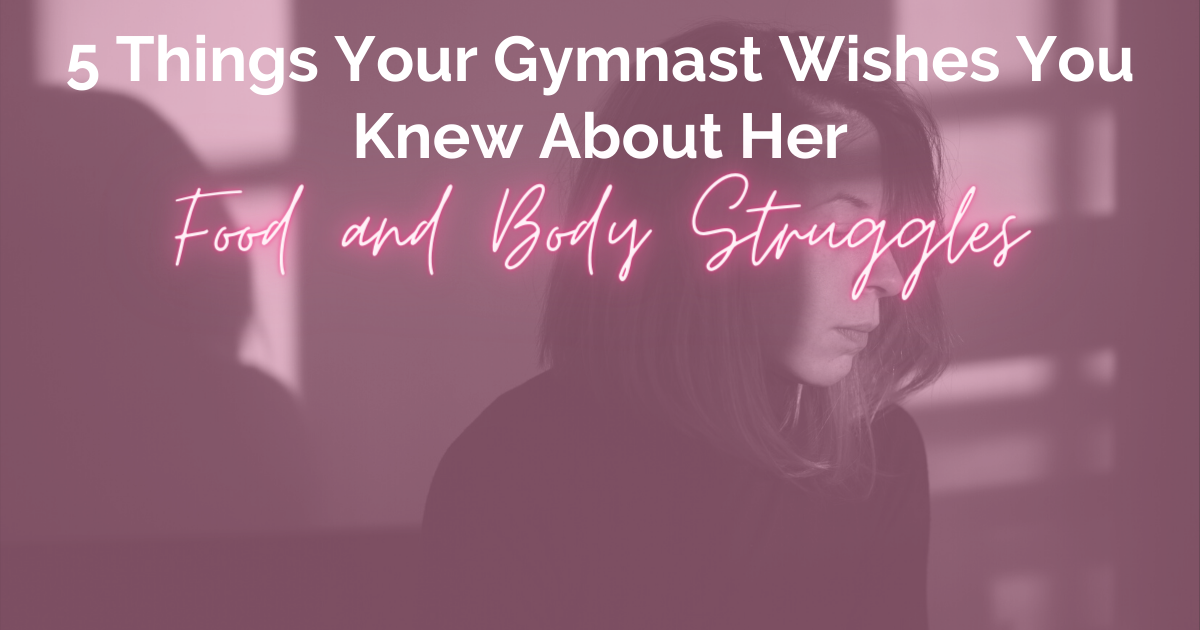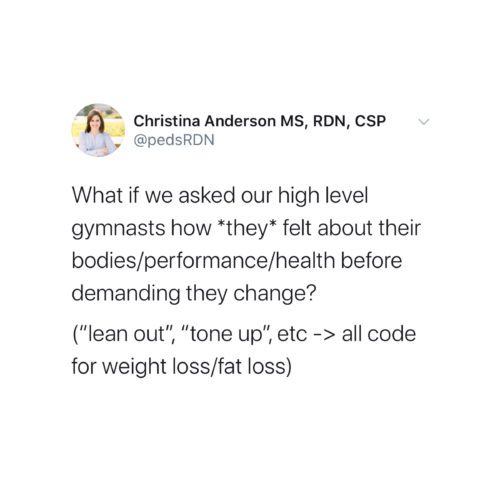
5 things your gymnast wishes you knew about her food and body struggles
explore the blog
free training
The Podcast
Learn to fuel the gymnast for optimal performance and longevity in the sport.
How to Fuel the Gymnast
Learn how to fuel your gymnast so that you can avoid the top 3 major nutrition mistakes that keep most gymnasts stuck, struggling, and injured.
looking for...?

Do you ever wonder if your gymnast is struggling more with food and her body than she’s letting on? If so, you’re probably right.
Or, maybe she’s come to you and admitted she’s having a hard time, “feels fat”, and is worried about food and her body.
Here are 5 things you must know as a parent or coach in order to help you gymnast.
1. It’s not just about the food
Food struggles are a symptom. We all learn to cope with something growing up, and some kids learn to cope with food. Though this isn’t necessarily helpful, it’s very common. Sometimes this morphs as a lack of food and turns into a restrictive eating disorder or other times turns into overeating and then the binge/restrict cycle.
If your gymnast is wanting to “go on a sugar detox” or starts avoiding her favorite foods to “get healthier”, this is often a sign that she’s feeling inadequate, “fat”, or that something feels out of control in her life. She most likely doesn’t want you to know she’s struggling. A gymnast is “supposed” to be “strong”, “show no emotion”, and “just do it”, so we’re told. Well, the reality is they struggle just as much is not more thanks to the perfectionist type-A personalities.
The COVID-19 Quarantine is the perfect example for something that has brought to light many individuals food struggles. We’ve been in this semi-isolation for 4+ months people are struggling with the lack of socialization, disruption to their normal routine, hobbies, etc. I know TONS of gymnasts who are struggling with food and their bodies right now. Aside from the existing societal pressures and their developing bodies, this quarantine has been the first time a lot of gymnasts have been out of the gym for more than a week or two at a time. Time out of the gym means less routine, less structure, and more opportunity for mindless/boredom eating. In addition, many young gymnasts do not have the coping skills to deal with the “loss” of their sport or the timeline they had in their head to achieve their goals. There is a lot of anxiety about the future, and this can easily translate into trying to use food as it’s one of the “controllables”.
2. There’s a lot of pressure (social media, comparison, etc)
Your gymnast is looking at teammates, her siblings, friends at school, Instagram and TikTok idols, TV stars, and so much more. We live in a digital age where there’s ample opportunity for constant comparison and it kills. There is so much garbage online, be it pro-anorexia TikTok accounts telling young girls how to starve themselves or the near-naked “fitfluencer” on Instgram who is showing off her fit body that is as product of a deathly eating disorder (thought that’s not the façade she has promoted that your gymnast thinks is reality).
Your gymnast also compares herself to you, be it her parent or coach. If you have a slimmer or more “fit” body type with perhaps more toned abs, arms, thinner legs, etc…she sometimes compares herself and feels inadequate. She doesn’t understand that as an athlete she has a different body type than you (unless you’re also a high level gymnast working out 20+ hours a week). She also may have no idea that you may be struggling with your own body, be it a medical condition, eating disorder, mental illness, or something else that is effecting your ability to nourish your body. I don’t bring this up to shame or condemn as we ALL struggle. But, your young gymnasts don’t entertain the possibility that what they see isn’t reality or healthful.
3. What you say can hurt your gymnast
Your gymnast doesn’t need you to tell her she’s “gained weight”.
I’d bet that 99.9% of the time someone knows their body has changed and they’ve gained weight. Sometimes the changes are more subtle, like a gymnast going through puberty, especially while they still have the innocence of not constantly thinking about or picking at their body.
Telling her she’s “getting big” and then restricting her food is only making the situation worse. The worse she feels about herself, the more she wants to eat (or not eat). Then the more you restrict/control her food, the more she wants to eat.
She may have gained weight and it could be perfectly normal. She may have gained excessive weight, but this is a sign that something else is going on. It could be medical (hypothyroidism, PCOS, etc) but is more likely related to food and body image issues. First stop could be the pediatrician to check the growth charts and see if this is normal or not.
4. She needs your help, but not how you think. Ask how you can help? Be ready to listen, not just “fix”
Be vulnerable- your gymnast needs to know you’re not perfect either.
Role modeling healthy behaviors speaks louder than any nutrition advice you could give your gymnast. Don’t “do as I say, not as I do”. Don’t let her not order the French fries with her burger when you are, plus a soda. Yes, you have different nutritional needs but that also doesn’t excuse your over-eating or undereating at meals/snacks.
She needs to see you treat your body well and nourish it.
She needs to see you accept that your body isn’t perfect and that’s OK
She needs to see you eat normal meals, snacks, the occasional fun foods, etc and not binging, overeating, drinking too much, etc. Sure, she’s an athlete and is parading around in a leotard all day but one day she’ll need to learn
She wants you to listen-She may be struggling with anxiety or depression and need to develop healthier coping skills. Be open to investing in mental coaching or therapy. There is still a lot of shame and stigma around mental health issues, especially in sports. Therapy or counseling can be life changing and isn’t the same as just “talking to mom”. It doesn’t make you a bad parent if you can’t fix your gymnasts food and body struggles.
Be mom or dad, not the health professional. Even if were qualified to help her (therapist, dietitian, etc), it’s always better coming from a “neutral third party”.
Her “I’m fine” is code for “I’m not fine but I’m too scared or embarrassed to tell you what’s going on because I feel judged”. When you chastise her about food or her body, you diminish the trust relationship. She no longer feels like you’re a safe place where she can share her struggles.
5. She may need you to create a healthier food environment.
Nagging your gymnast about her food and exercise is more likely to do harm than good. The negative pressure can easily make her “run the other way” and get the unintended opposite effect. Don’t be the Food Police.
She doesn’t need to diet. There are SO many other issues we can address that will help her body regulate to where it needs to be aside from counting calories, limiting/restricting her foods, etc.
She wants you to know that asking her to diet or detox with you isn’t really helpful and only makes her crave/want the forbidden foods more. She wishes you’d serve more of the “fun foods” so that she doesn’t feel like she needs to “eat all the food” when she finally gets the chance to eat some pizza or cookies.
Too much “fun food” aka junk food, too much fast food, eating out etc, can by default cause excessive of amount of calories to be consumed at meals due to the fact that fast foods, packaged/highly processed fodos, and restaurant meals are *often* high in calories due to excessive portions sizes and more added sugar, salt, and fat than you’d add at home.
She doesn’t need you to get rid of EVERYTHING, but instead of 10 different kinds of chips, cookies, sugary cereal, sodas, etc…pick everyone’s favorite and serve them regularly enough that they are not “off limits”.
Demonstrate balanced meals by serving veggies at every meal, serving salad or cut veggies when ordering in pizza, and including mostly whole grains and high fiber carbohydrates like grains, potatoes, etc.
In Summary
I hope this helps you. I crafted this list of tips from years of experience working with high level young athletes and their parents, as well as being a former young athlete who struggled with an eating disorder. I did not get the care I needed at 16 because of a lot of the reasons I listed above, so I continued to struggle for years until I pursued counseling in college as I was tired of struggling with food and my body. Don’t wait that long. Aggressive treatment and help for food and body struggles will have a much better outcome that denying there is an issue or pretending there isn’t because it seems like something big and scary. If your gymnast broke her leg, you’d have no problem taking her to the orthopedist and then physical therapy for rehab. I want you to think about food and body image struggle in the same light, though this time your “team” is a physician, registered dietitian nutritionist, and a therapist/counselor/sports psychologist with eating disorder/body image training.
If you’re athlete is struggling, please shoot me a message and let’s schedule a free 20 minute chat.
on the blog